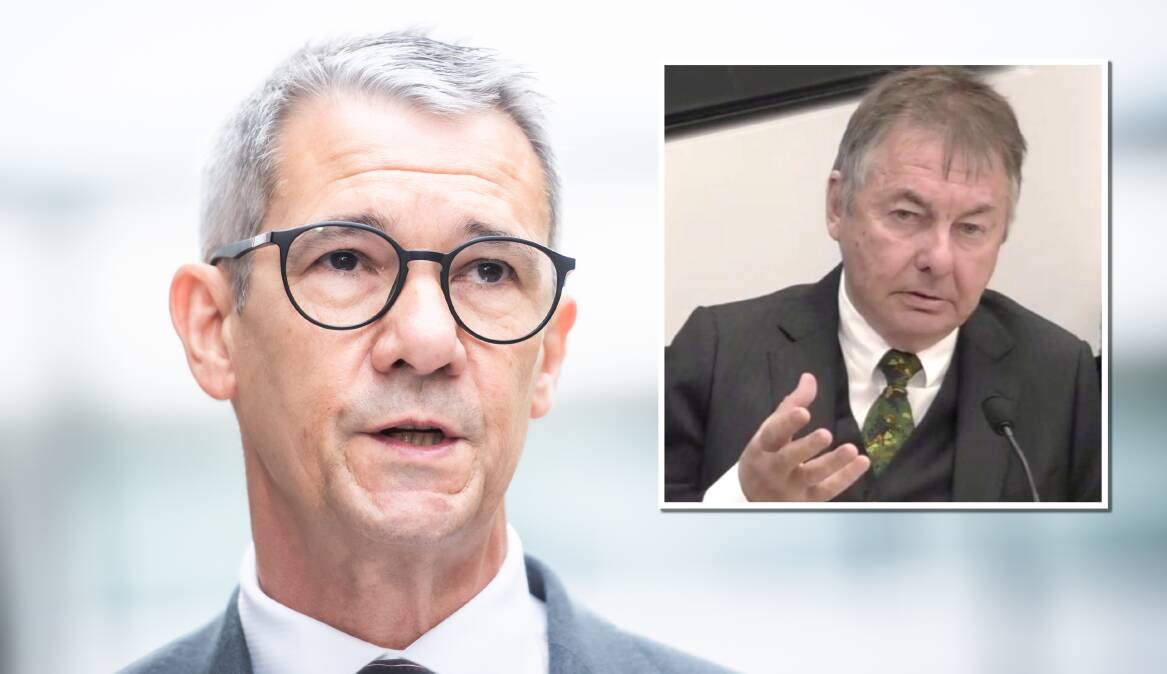A Board of Inquiry chair's relationship with a columnist from The Australian, alleged to have "poisoned his mind", was not "preferential treatment", a court has heard.
A lawyer for Walter Sofronoff KC has claimed his 273 "communications" and a private lunch with Janet Albrechtsen was simply a result of her being "persistent".
The former ACT top prosecutor, Shane Drumgold SC, has launched legal action and is seeking an 839-page board of inquiry report, written by Mr Sofronoff, be quashed or, alternatively, the conclusions made in relation to him be declared invalid, or affected by bias, or a denial of natural justice.
Mr Drumgold resigned as director of public prosecutions in 2023 after being slammed in the report.
It examined the now-dropped prosecution of Bruce Lehrmann, who has always denied raping fellow former Liberal staffer Brittany Higgins at Parliament House in 2019.
'The most persistent'
A lawyer for the former top prosecutor has alleged Mr Sofronoff's relationship with journalist Ms Albrechtsen caused an apprehended bias.
Counsel for Mr Sofronoff, Brendan Lim, told the ACT Supreme Court on Wednesday there was "no preferential treatment".
Mr Lim stated the inquiry chair gave evidence in an affidavit that he had "engaged with any journalist who approached him".
"Ms Albrechtsen was the most persistent," Mr Lim said.
The court previously heard that before the report was handed down Ms Albrechtsen had flown to Brisbane to have lunch with Mr Sofronoff.
The pair are said to have had 273 "communications" in a seven-month period, including 51 phone calls.
On Wednesday, the court heard Mr Sofronoff claims the phone calls were about "practical matters" including when documents would be made available and the timing of the inquiry.
"It's far from clear if any [of the calls], if not all of them, were initiated by Mr Sofronoff," Mr Lim said.
Did alleged bias 'infect' report author?
Counsel for the ACT government, Kate Eastman SC, said there was no evidence to support allegations Mr Sofronoff's communications with Ms Albrechtsen "poisoned his mind".
A lawyer for Mr Drumgold, Dan O'Gorman, previously claimed Ms Albrechtsen had written numerous "nasty" articles about the former DPP, which "cast him in a negative light by impugning his character and credibility".

While Ms Eastman accepted some of the articles reflected Ms Albrechtsen's point of view, others were "reporting of other people's opinions".
"Some of these are descriptions of what other people have said about the plaintiff, not just what she said about the plaintiff," Ms Eastman told the court.
"The question is whether or not these are sufficient factors in establishing ... that Ms Albrechtsen had bias."
If it is established that the columnist was biased against Mr Drumgold, Ms Eastman said "very little has been done to establish a logical connection" to this influencing the report.
"There is no evidence to support [Mr Sofronoff] was infected or poisoned," Ms Eastman told the court.

'No opportunity' for 'preyed on' finding response
On Wednesday, Mr O'Gorman alleged the former director of public prosecutions "wasn't given an opportunity" to respond to a finding he had "preyed on" the inexperience of a junior prosecutor.
The findings of misconduct in relation to Mr Drumgold include that he dishonestly tried to prevent Mr Lehrmann's lawyers from obtaining material.
While these documents were ultimately disclosed, Mr Drumgold earlier instructed a junior solicitor to prepare an affidavit that claimed the material was privileged.
In the report, Mr Sofronoff found the former top prosecutor had "deliberately advanced a false claim of legal professional privilege and misled the court".
On Wednesday, Mr O'Gorman claimed his client "wasn't given an opportunity to provide responsive evidence" to this finding.
Mr O'Gorman alleged a notice of adverse comment "did not advise Mr Drumgold of any proposed finding to the effect he had 'preyed on'" a junior solicitor's experience.
"Nor were the inferential facts that gave rise to those findings put to Mr Drumgold in the course of his evidence in the inquiry," Mr O'Gorman said.
However, Ms Eastman told the court two notices of potential adverse comments had been issued to Mr Drumgold.
She told the court he was also given the opportunity to make submissions about whether he was fit to remain on the role of barristers.
"The plaintiff's submissions were accepted and no finding or recommendation was made in relation to that issue."
Ms Eastman said Mr Drumgold had given five days of oral evidence during the inquiry hearing but "became significantly medically unwell" and was given leave.
"[Mr Drumgold] was advised by his treating specialist that it could be detrimental to his current state of health to be subjected to the ongoing pressures of giving evidence," she stated.
The inquiry, ultimately, decided he was not required to give further evidence.
The trial against Mr Lehrmann was aborted last year because of juror misconduct, with the charge levelled at the former Liberal staffer, who maintains his innocence, later discontinued.
The hearing is set to continue on Thursday.







